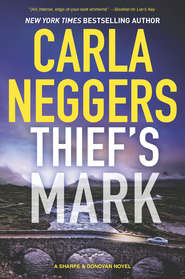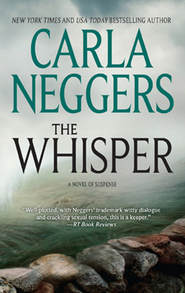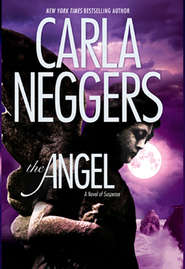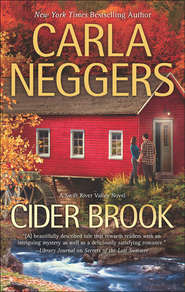По всем вопросам обращайтесь на: info@litportal.ru
(©) 2003-2024.
✖
Harbor Island
Автор
Год написания книги
2018
Настройки чтения
Размер шрифта
Высота строк
Поля
Colin said nothing. He noticed Finian lift his water glass and take a sip but kept his attention on Maisie Bristol’s mythologist. “Did you just happen into the bar here and strike up a conversation with Father Bracken?”
“As a matter of fact, that’s exactly what I did,” Fairbairn said. “I wanted to give Maisie and her father time to themselves and walked over here, somehow thinking it would be a good idea to pay my respects or whatever to Aoife O’Byrne. Fortunately, I changed my mind and decided on Scotch, instead, and met Father Bracken. How do you two know each other?”
“We’re friends,” Colin said without elaboration.
The Brit set his glass down. “A good day to have a priest for a friend.”
“Aoife called me,” Finian said, addressing Colin. “Kitty called, too. And Sean.”
Colin hadn’t planned on asking for an explanation in front of Oliver Fairbairn. “Makes sense,” he said.
Finian leveled his midnight-blue eyes on Colin. “Aoife has checked out of the hotel. She’s driving back to Maine with me. She’s on her way down with her things.”
Fairbairn’s eyebrows shot up. “Aoife O’Byrne is going back to Maine with you? A beautiful woman, a famous Irish artist? Good heavens, man, won’t your parishioners have fits if you sneak her into the rectory?”
Colin pretty much had the same question.
Finian looked unruffled. “I’ve booked a room for her at a local inn,” he said.
“Well, then. That solves it.” Fairbairn sat back and picked up his glass. “How on earth did you end up in Maine? A long story, I gather?”
“Are there any short Irish stories?” Finian asked with a shrug.
Fairbairn seemed to know Finian had said all he planned to about his relationship with Aoife O’Byrne. “Good point.” He downed more of his Scotch, not savoring it this time. “I’m afraid the shock of Rachel’s death has led me to drink too fast. If I make an ass of myself, will you please excuse me? Or am I too late, and I should put that in past tense and beg your forgiveness?”
Finian cracked the smallest of smiles, the first break in his obvious tension since Colin had arrived. “You’re doing fine, my friend. Glenfiddich 18 is a beautiful Scotch. At least you didn’t ruin it with ice.”
“I like how you think, Father Bracken. What about you, Agent Donovan? You won’t join me for a dram?”
“Not tonight, thanks,” Colin said.
“I suppose what happened today didn’t faze you. Nerves of steel and all that. I’ve only known Maisie a couple of months and hardly knew Rachel, and I’m flattened.”
Colin thought of the moment he’d realized Emma was on Bristol Island alone, with a woman dead at her feet and a shooter on the run—or getting ready to fire again. He noticed Finian’s scrutiny, but his priest friend made no comment.
Oblivious, Oliver Fairbairn polished off the last of his Scotch. “I suppose you’re wondering what I do. As I told the detectives, I’m a useless academic who doesn’t have a normal job. It’s true.”
“You’re an independent scholar,” Finian said.
“A nicer way to put it. I’m not affiliated with any particular institution. I was fortunate to find work as a Hollywood consultant. If you want to know about the real Thor, I can tell you. Of course, there is no real Thor, is there?”
Colin sat back, feeling the heat from the fire. “I just know he’s the one with the hammer. You’ve been working with Maisie on understanding Irish Celtic myths and legends.”
“She’s an eager student. A sponge. She wants to know everything. It’s refreshing. Exhilarating, really, as you can imagine, for someone like me to have this wildly hot Hollywood producer interested in everything I can tell her about ogham stones and holy wells.”
“And Saint Declan,” Colin added.
Fairbairn’s face fell. He looked as if he wanted to crawl into his Scotch glass. He picked up his water glass, instead. “Saint Declan is a recent interest for Maisie, because of Rachel. Which, of course, you already know, Agent Donovan. The interaction of pagan Celtic culture and the early Irish Christian saints—like Declan—shows a dynamic relationship. Pagan culture didn’t wither away and Christianity didn’t smother it. It’s not that black and white. It’s the stuff of great movies, I’ve no doubt. I’m eager to see what Maisie does with her knowledge and interest.” He turned to Finian. “I’m sure you know more about Saint Declan than I do, Father Bracken.”
“Have you ever been to Ardmore or Declan’s Cross?” Finian asked.
“I was in Ardmore a few years ago. Maybe it’s been longer now—six years? I travel so much. It’s hard to keep track. I suppose I could have wandered through Declan’s Cross when I was in the area. I don’t recall. There’s a fabulous hotel in Ardmore. It’s built into the cliffs above the village.”
“I know it well,” Finian said. “It has an excellent Scotch selection.”
Fairbairn nodded. “I blew the budget and booked two nights. I crawled through Saint Declan’s monastic ruins, walked on the beach and enjoyed a good dinner and a good Scotch. Then I went back to London.”
“Were you a Hollywood consultant then?” Colin asked.
“Just a hopeful academic.”
Colin kept his focus on the Brit. “Is consulting your main source of income?”
“Oh, you feds will ask anything, won’t you?” Fairbairn seemed more caught up in the drama of the moment than offended. “For the past eighteen months, yes, it’s been my main source of income. I don’t know about the future.”
“Do you teach?”
“Not any longer. In the past I taught a university course here and there.”
“When did you arrive in Boston?”
“This trip? Yesterday. I flew in from London. Maisie had asked me to be back today if at all possible.”
“When?” Colin asked.
“A few days ago. Wednesday, maybe?” Fairbairn waved a hand. “I’m still jet-lagged. I don’t have a good sense of the days. Maisie told me she and Rachel weren’t seeing eye to eye on Maisie’s film project. She thought I might be able to help. I didn’t get the impression that their differences were anything they wouldn’t be able to work out. Maisie’s the one with the checkbook, after all. Rachel was nothing if not about making things happen, and if it had to be Maisie’s way for the movie to get made—then so be it. Rachel was certain in her convictions, but she was also pragmatic. That’s my take, anyway, for what it’s worth.”
“And Maisie?” Colin asked. “Is she as certain in her convictions?”
“In a different way. Maisie picks which ships to launch and launches them, so to speak. She doesn’t get involved with details. This project was to have been a bit different. She didn’t want just to launch the ship. She wanted her fingerprints on everything. Rachel worked in the engine room—it’s what suited her—but she wanted to move up, launch a few ships of her own.”
Finian lifted his water glass. “What about her ex-husband?”
“Travis does his own thing. He’s well respected in Hollywood from what little I know. Rachel was one of those ex-spouses who doesn’t go away. Keeps a relationship with the family. I don’t know whether that’s good or bad. She and Travis didn’t have any kids together, not even a shared dog.” Fairbairn breathed out and let his shoulders sag, as if he’d suddenly lost all his energy. “I should get back there and let you two chat. Please give my best to Aoife, won’t you, Father? We’ve never met, but I happened into a gallery in London that had several of her paintings on display. Irish sunrises and sunsets, and one cheeky-looking porpoise. If I’d had the money, I’d have bought that porpoise.”
“I don’t know if that painting has ever sold,” Finian said.
“Then maybe there’s yet hope.” Fairbairn’s voice cracked, as if the emotions of the day had finally caught up with him. “It’s been a pleasure, despite the circumstances. If I can be of any assistance, Agent Donovan, please don’t hesitate to get in touch with me. Father, I hope the tongues don’t wag too much when you bring Aoife O’Byrne to town.”
He started to pay for his drink, but Finian refused to let him. Fairbairn mumbled his thanks, and shuffled out of the bar.
Finian smiled at Colin. “You look as if you’re thinking up an excuse to arrest me.”
“Don’t tempt me. Why didn’t you let me know you were coming down here?”
“I didn’t want to bother you.”
“Bother me? When you know a woman in the middle of a homicide investigation?”











